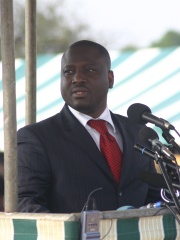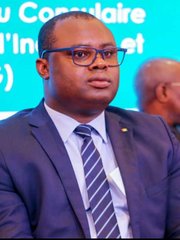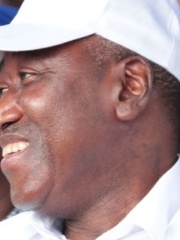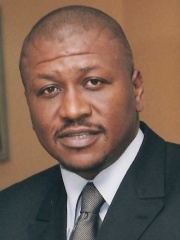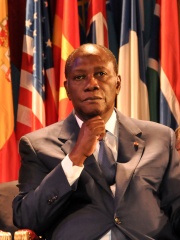
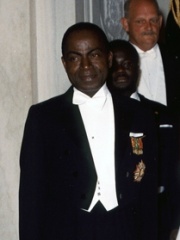
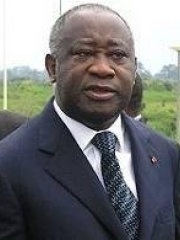
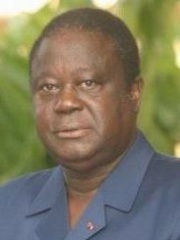
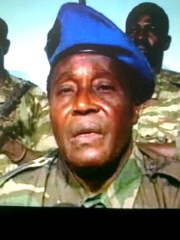
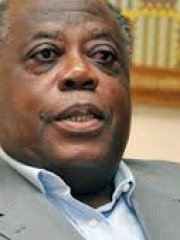
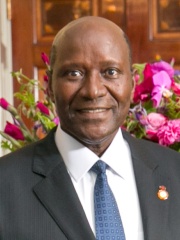
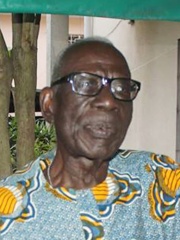
The Most Famous
POLITICIANS from Côte d'Ivoire
This page contains a list of the greatest Ivorian Politicians. The pantheon dataset contains 19,576 Politicians, 15 of which were born in Côte d'Ivoire. This makes Côte d'Ivoire the birth place of the 132nd most number of Politicians behind United Arab Emirates, and Mozambique.
Top 10
The following people are considered by Pantheon to be the top 10 most legendary Ivorian Politicians of all time. This list of famous Ivorian Politicians is sorted by HPI (Historical Popularity Index), a metric that aggregates information on a biography's online popularity. Visit the rankings page to view the entire list of Ivorian Politicians.

1. Alassane Ouattara (b. 1942)
With an HPI of 71.72, Alassane Ouattara is the most famous Ivorian Politician. His biography has been translated into 68 different languages on wikipedia.
Alassane Dramane Ouattara (; French pronunciation: [alasan wataʁa]; born 1 January 1942) is an Ivorian politician and economist who has been President of Ivory Coast (Côte d'Ivoire) since 2010. An economist by profession, he worked for the International Monetary Fund (IMF) and the Central Bank of West African States (French: Banque Centrale des Etats de l'Afrique de l'Ouest, BCEAO), and was the Prime Minister of Côte d'Ivoire from November 1990 to December 1993, appointed to that post by then-President Félix Houphouët-Boigny. Ouattara became the president of the Rally of the Republicans (RDR), an Ivorian political party, in 1999.

2. Félix Houphouët-Boigny (1905 - 1993)
With an HPI of 69.56, Félix Houphouët-Boigny is the 2nd most famous Ivorian Politician. His biography has been translated into 53 different languages.
Félix Houphouët-Boigny (French: [feliks ufwɛ(t) bwaɲi]; 18 October 1905 – 7 December 1993), affectionately called Papa Houphouët or Le Vieux ("The Old One"), was an Ivorian politician and physician who served as the first president of Ivory Coast from 1960 until his death in 1993. A tribal chief, he worked as a medical aide, union leader, and planter before being elected to the French Parliament in 1945. He served in several ministerial positions within the Government of France before leading Ivory Coast following independence in 1960. Throughout his life, he played a significant role in politics and the decolonisation of Africa. Under Houphouët-Boigny's politically moderate leadership, Ivory Coast prospered economically. This success, uncommon in poverty-ridden West Africa, became known as the "Ivorian miracle"; it was due to a combination of sound planning, the maintenance of strong ties with the West (particularly France) and development of the country's significant coffee and cocoa industries. However, reliance on the agricultural sector caused difficulties in 1980, after a sharp drop in the prices of coffee and cocoa. Throughout his presidency, Houphouët-Boigny maintained a close relationship with France, a policy known as Françafrique, and he built a close friendship with Jacques Foccart, the chief adviser on African policy in the administrations of Charles de Gaulle and Georges Pompidou. He aided the conspirators who ousted Kwame Nkrumah from power in Ghana in 1966, took part in the failed coup against Mathieu Kérékou in Benin in 1977, was suspected of involvement in the 1987 coup d'état that removed Thomas Sankara from power in Burkina Faso and provided assistance to UNITA, a United States-supported, anti-communist rebel movement led by Jonas Savimbi in Angola. Houphouët-Boigny maintained a strong anti-communist foreign policy, which resulted in, among other things, severing diplomatic relations with the Soviet Union in 1969 (after first establishing relations in 1967) and refusing to recognise the People's Republic of China until 1983. He re-established relations with the Soviet Union in 1986. In the West, Houphouët-Boigny was commonly known as the "Sage of Africa" or the "Grand Old Man of Africa". Houphouët-Boigny moved the country's capital from Abidjan to his hometown of Yamoussoukro and built the world's largest church there, the Basilica of Our Lady of Peace, at a cost of US$300 million. At the time of his death, he was the longest-serving leader in Africa's history and the third longest-serving leader in the world after Fidel Castro of Cuba and Kim Il Sung of North Korea. In 1989, UNESCO created the Félix Houphouët-Boigny Peace Prize for the "safeguarding, maintaining and seeking of peace". After his death, conditions in Ivory Coast quickly deteriorated. Between 1994 and 2002, there were a number of coups, a devaluation of the CFA franc and an economic recession; a civil war began in 2002.

3. Laurent Gbagbo (b. 1945)
With an HPI of 69.04, Laurent Gbagbo is the 3rd most famous Ivorian Politician. His biography has been translated into 63 different languages.
Koudou Laurent Gbagbo (Gagnoa Bété: Gbagbo [ɡ͡baɡ͡bo]; French pronunciation: [loʁɑ̃ baɡbo]; born 31 May 1945) is an Ivorian politician who was the president of Côte d'Ivoire from 2000 until his arrest in April 2011. He was the first president in the history of the country that was a centre-left politician. A historian, Gbagbo was imprisoned in the early 1970s and again in the early 1990s, and he lived in exile in France during much of the 1980s as a result of his union activism. Gbagbo founded the Ivorian Popular Front (FPI) in 1982 and ran unsuccessfully for president against Félix Houphouët-Boigny at the start of multi-party politics in 1990. He won a seat in the National Assembly of Côte d'Ivoire in 1990. Gbagbo claimed victory after Robert Guéï, head of a military junta, barred other leading politicians from running in the October 2000 presidential election. The Ivorian people took to the streets, toppling Guéï. Gbagbo was then installed as president. In the 2010 presidential election, Alassane Ouattara defeated Gbagbo, and was recognized as the winner by election observers, the international community, the African Union (AU), and the Economic Community of West African States. However, Gbagbo refused to step down, despite mounting international pressure. The Independent Electoral Commission (IEC) announced that Ouattara had won the race with 54% of the vote, a tally that the United Nations concluded was credible; however, the Constitutional Council, a body dominated by pro-Gbagbo members, annulled the results in Ouattara's electoral strongholds in the north, claiming fraud, and declared Gbagbo the winner with 51% of the vote. In December 2010, both Gbagbo and Ouattara assumed the presidency, triggering a short period of civil conflict in which about 3,000 people were killed. Gbagbo was arrested in 2011 by pro-Ouattara forces, who were supported by French troops. Gbagbo was extradited to The Hague in November 2011, where he was charged with four counts of crimes against humanity in the International Criminal Court (ICC) in connection with the post-election violence. Gbagbo was the first former head of state to be taken into the court's custody. In January 2019, an ICC panel dismissed the charges against Gbagbo and one of his former ministers, Charles Blé Goudé, determining that the evidence presented was insufficient to prove that the pair committed crimes against humanity. Prosecutors appealed the decision, and Gbagbo was prohibited from returning to Côte d'Ivoire pending the appeal proceedings. The ICC ultimately upheld Gbagbo's acquittal, and in April 2021, Ouattara stated he and Blé Goudé were free to return to the country.

4. Henri Konan Bédié (1934 - 2023)
With an HPI of 62.36, Henri Konan Bédié is the 4th most famous Ivorian Politician. His biography has been translated into 37 different languages.
Aimé Henri Konan Bédié (5 May 1934 – 1 August 2023) was an Ivorian politician. He was President of Côte d'Ivoire from 1993 to 1999, and formerly President of the Democratic Party of Ivory Coast – African Democratic Rally (PDCI–RDA). Prior to becoming president, he was a member and president of the National Assembly of Ivory Coast. He unsuccessfully sought another term as president in the 2020 presidential election.
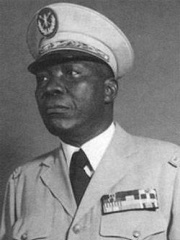
5. Sangoulé Lamizana (1916 - 2005)
With an HPI of 61.92, Sangoulé Lamizana is the 5th most famous Ivorian Politician. His biography has been translated into 28 different languages.
Aboubakar Sangoulé Lamizana (31 January 1916 – 26 May 2005) was an Upper Voltan military officer who served as the President of Upper Volta (since 1984 renamed Burkina Faso), in power from 3 January 1966, to 25 November 1980. He held the additional position of Prime Minister from 8 February 1974, to 7 July 1978.

6. Robert Guéï (1941 - 2002)
With an HPI of 60.62, Robert Guéï is the 6th most famous Ivorian Politician. His biography has been translated into 30 different languages.
Robert Guéï (French pronunciation: [ʁɔbɛʁ ɡe.i]; 16 March 1941 – 19 September 2002) was an Ivorian politician who served as the third president of the Ivory Coast from 24 December 1999 to 26 October 2000. He succeeded President Henri Konan Bédié after the 1999 Ivorian coup d'état and lost to Laurent Gbagbo in the ensuing 2000 Ivorian presidential election. Guéï, his wife Rose Doudou Guéï, and his children were killed on 19 September 2002 on the first day of the First Ivorian Civil War.

7. Charles Konan Banny (1942 - 2021)
With an HPI of 58.39, Charles Konan Banny is the 7th most famous Ivorian Politician. His biography has been translated into 26 different languages.
Charles Konan Banny (11 November 1942 – 10 September 2021) was an Ivorian politician, who served as prime minister from 7 December 2005 until 4 April 2007.

8. Daniel Kablan Duncan (b. 1943)
With an HPI of 57.87, Daniel Kablan Duncan is the 8th most famous Ivorian Politician. His biography has been translated into 28 different languages.
Daniel Kablan Duncan (born 30 June 1943) is an Ivorian politician. He previously served as Prime Minister of Ivory Coast from 11 December 1993 to 24 December 1999 and again from November 2012 to January 2017. He was Minister of Foreign Affairs from June 2011 to November 2012. He was also the first Vice President of Ivory Coast, after the recreation of this office, from January 2017 until 13 July 2020.

9. Bernard Binlin Dadié (1916 - 2019)
With an HPI of 55.45, Bernard Binlin Dadié is the 9th most famous Ivorian Politician. His biography has been translated into 22 different languages.
Bernard Binlin Dadié (10 January 1916 – 9 March 2019) was an Ivorian novelist, playwright, poet, and governmental administrator. Starting in 1957, he held many governmental positions in the Côte d'Ivoire, including Minister of Culture from 1977 to 1986.

10. Seydou Diarra (1933 - 2020)
With an HPI of 53.26, Seydou Diarra is the 10th most famous Ivorian Politician. His biography has been translated into 19 different languages.
Seydou Elimane Diarra (23 November 1933 – 19 July 2020) was an Ivorian politician, who served as the Prime Minister in 2000 and again from 2003 to 2005.
People
Pantheon has 15 people classified as Ivorian politicians born between 1905 and 1980. Of these 15, 6 (40.00%) of them are still alive today. The most famous living Ivorian politicians include Alassane Ouattara, Laurent Gbagbo, and Daniel Kablan Duncan. The most famous deceased Ivorian politicians include Félix Houphouët-Boigny, Henri Konan Bédié, and Sangoulé Lamizana. As of April 2024, 1 new Ivorian politicians have been added to Pantheon including Bernard Goumou.
Living Ivorian Politicians
Go to all RankingsAlassane Ouattara
1942 - Present
HPI: 71.72
Laurent Gbagbo
1945 - Present
HPI: 69.04
Daniel Kablan Duncan
1943 - Present
HPI: 57.87
Jeannot Ahoussou-Kouadio
1951 - Present
HPI: 51.10
Guillaume Soro
1972 - Present
HPI: 49.11
Bernard Goumou
1980 - Present
HPI: 40.50
Deceased Ivorian Politicians
Go to all RankingsFélix Houphouët-Boigny
1905 - 1993
HPI: 69.56
Henri Konan Bédié
1934 - 2023
HPI: 62.36
Sangoulé Lamizana
1916 - 2005
HPI: 61.92
Robert Guéï
1941 - 2002
HPI: 60.62
Charles Konan Banny
1942 - 2021
HPI: 58.39
Bernard Binlin Dadié
1916 - 2019
HPI: 55.45
Seydou Diarra
1933 - 2020
HPI: 53.26
Amadou Gon Coulibaly
1959 - 2020
HPI: 52.14
Hamed Bakayoko
1965 - 2021
HPI: 49.05
Newly Added Ivorian Politicians (2025)
Go to all RankingsOverlapping Lives
Which Politicians were alive at the same time? This visualization shows the lifespans of the 9 most globally memorable Politicians since 1700.


